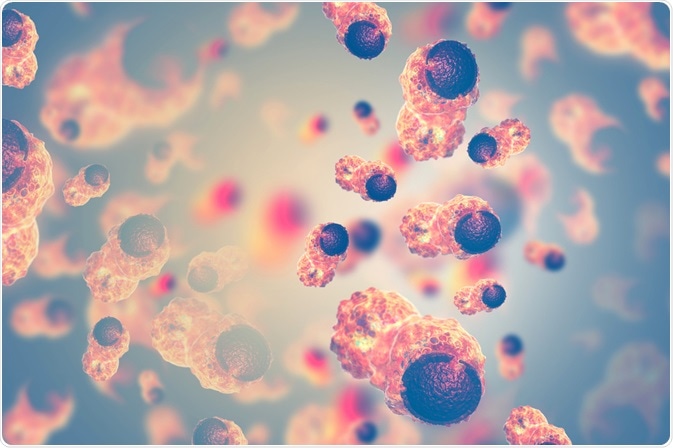Cancer is one of the leading causes of death worldwide. Understanding the causes of cancer growth and progression is therefore of paramount concern to scientists and doctors worldwide. Research into cancer signaling pathways, including the JNK pathway, is providing crucial information in this field which can lead to better therapeutics and survival rates for patients.

Image Credit: crystal light/Shutterstock.com
The JNK Protein
Discovered in the 1990s, the JNK protein, or, to give it its full name, c-Jun NH2-terminal kinase, was found to be the protein kinase responsible for the phosphorylation of c-Jun at Ser-63 and Ser-73. It is a type of protein kinase, a class of biologically important enzymes that are involved in intracellular signaling functions. Specifically, they belong to the mitogen-activated protein kinase (MAPK) family.
Signals from a diverse range of intra and extra-cellular stress stimuli, including inflammation, ultraviolet radiation, cytokines, DNA damage, and heat or osmotic shock are relayed, amplified, and integrated by MAPKs including the JNK protein.
The JNK protein consists of 10 isoforms derived from 3 genes – JNK1 (four isoforms), JNK2 (two), and JNK3 (three isoforms.) There are no functional differences between the isoforms, and the genes are expressed as either 46KDa or 55KDa protein kinases depending on how the 3’ coding region of the corresponding mRNA is expressed.
These proteins and their signaling pathways play several important functions within the body, including neurological signaling, apoptosis, DNA repair, and cancer progression. There are, however, several unknowns that researchers are still trying to work out; how the JNK protein directly modifies the function of target substrate proteins, how signaling intermediaries are affected by its involvement, and how, ultimately, cellular behavior is modified in positive or negative ways.
JNK Signaling and Cancer
Early research into the JNK protein led to the idea that it was a positive regulator of cellular transformation. Ser-63 and Ser-73 were known to be essential for stimulating c-Jun activity and that they were involved in oncogenic transformation. However, studies analyzing JNK gene deletion using mouse models of cancer provided conflicting findings. Some showed pro-oncogenic functions, whilst others suggested tumor-suppressing activity.
Mouse models of cancer seem to suggest that the contribution of JNK to cancer development is both cell and tissue type and isoform-specific. Purkinje cells, for example, are refractory to the JNK1 signaling pathway which is involved in autophagy in nonneuronal cells. Different JNK isoforms have specific functions in skin cells; JNK1 can suppress antiapoptotic gene expression and JNK2 negatively regulates specific gene activity related to tumor suppression as well as the induction of apoptosis, cell growth, and cell differentiation.
Overactivation of JNK has been linked to smoking-related tumor-promoting activity in lung cancer. Activation of JNK1, but not JNK2, is involved in tumor cell proliferation in hepatocellular carcinomas.
In ovarian cancer, a major cause of death amongst women worldwide (in the US alone in 2018 there were 14,070 deaths from OC), the JNK signaling pathway is abnormally activated. Studies have also found this to be the case in drug-resistant ovarian cancer
Studies have shown that the JNK pathway is essential for OC autophagy and cell death. This mediation can not only help ovarian cancer cells avoid apoptosis but can also induce autophagy-mediated cell death. However, evidence also exists that inhibition of JNK pathways can promote tumor cell death in OC. The JNK pathway plays a dual role in ovarian cancer.
A Complex Relationship
It is this contradiction that is at the heart of the enigmatic function of the JNK protein in the tumor microenvironment. The JNK protein seems to be involved in both tumor promotion and inhibition depending on several poorly understood factors. This may be due in part to evidence that the JNK protein both controls cell-autonomous functions and drives the expression of cytokines which act in a paracrine manner, sustaining cancer cell proliferation. There is no consensus as to whether JNK proteins are suitable targets for novel cancer therapeutics.
Future studies may help to unravel this enigma, including how JNK signaling is involved in inflammation as a result of oncogenic mutations and responses by the organism. Furthermore, in various human cancers, several clusters of mutations in multiple genes of the JNK pathway, including JNK1, JNK2, and MKK7 have been identified. Understanding these mutations and how they affect JNK and downstream product expression should also help to elucidate vital information.
In Conclusion: Where Do We Go from Here?
The JNK protein, its related pathways, and their involvement with and effect upon several different functions and diseases including cancer is still largely a grey area. It is still a relatively new discovery.
Currently, there is no consensus on whether JNK signaling pathway components can be used as suitable drug targets to treat cancer. Phenotypic analysis of mutations in novel transgenic mouse lines, as well as selective covalent inhibitors of JNK, could prove essential. In this way, general conclusions on this complex relationship and how blocking JNK signaling affects animal cancer modes which are relevant to human disease may yet be elucidated.
Last Updated: Dec 2, 2020